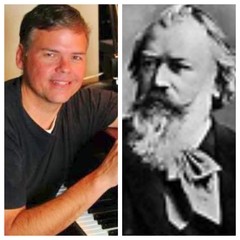|
Back
New York
BargeMusic
07/02/2021 -
“Dark Familiar: Music of Johannes Brahms”
Johannes Brahms: Prologue: Intermezzo in E flat major, Op. 117 No.1 – Songs: Treue Liebe, Op.7 No.1 (*) – Wie Melodien zieht es mir, Op.105 No.1 (*) – Interlude: Intermezzo in A major, Op.118 No.2 – Meine Liebe ist grün, Op.63 No.5 – Epilogue: Adagio from Violin Sonata No.3 in D minor, Op.108 (*)
Dmitri Shostakovich: Andante from Piano Concerto No. 2, Op.102
David Del Tredici: Songs of David (*)
(*) Arranged by Marc Peloquin
Marc Peloquin (Pianist)

M.Peloquin/J. Brahms (© Courtesy of the Artist/Wikipedia.commons)
“There is enormous sadness in (Brahms’) work, and yet it is a sadness that glows with understanding gloom by sharing its own.”
Alex Ross from New Yorker, quoted in program notes
Piano virtuoso, modern American music exponent, teacher and editor, Marc Peloquin showed another facet of his artistry last night at BargeMusic. Mr. Peloquin took diverse vocal and orchestral works, transcribing them for solo piano.
Mr. Peloquin is hardly original here: Baroque composers snatched themes from their colleagues and morphed them into every form. Liszt almost obsessively decapitated the vocal heads of his favorite songs to suit his fingers. And even Johannes Brahms, the centerpiece from last night, almost lost priority of his Piano Quartet when Arnold Schoenberg fattened it up into an orchestral masterwork.
Mr. Peloquin played two Brahms intermezzi unchanged (save for a few measures of introduction), three songs with voice eliminated, and one adagio from a Violin Sonata, for piano only, with mixed results.
Granted, he is a superb performer. Both the intermezzi were played with energy and joy. Obviously, this was an American artist. The Austrian moderation was missing, yet they were still impressive. A bit less impressive were Mr. Peloquin’s arrangements. Brahms made certain that voice and piano were separate entities. Thus, the richly emotional voice of Treue Liebe was distinct from the tender piano arpeggios. Mr. Peloquin rarely saw the difference. That and the two following songs were pleasant piano pieces, yet lacking that so important separation.
For the following two works, Mr. Peloquin retained the solo instruments, yet one still felt a scintilla of alienation. Granted, with lack of familiarity, they might have been more effective, but he still brought the “violin” to the treble side of the piano in the Brahms violin sonata.
As for the Andante of Shostakovich’s Second Piano Concerto, his playing was as “romantic” as he had described in own program notes. And yet, as sheerly beautiful as the original solo, one can never really forget the calm, lovely string orchestration of the original.
I was reminded of an earlier concert this week with Gil Shaham playing the Beethoven Violin Concerto with a “pocket-sized” sextet behind him. It had wonderful moments, but was like a charcoal reproduction of a painting.
The final five movements were totally new to me. Again, they were arrangements from a song cycle by David Del Tredici, a composer who has been recorded and edited by Mr. Peloquin. And with the composer himself sitting in the front row of BargeMusic, they must have had his blessings and his imprimatur.
Like everything from the composer, the five Songs of David were as tonal (even more tonal) than Brahms. They exercised the fingers as much as the mind. They were graceful and elegant and humorous. And to add an extra bell-and-whistle, the piano arrangements of the songs included Mr. Del Tredici’s own arrangement of Abide with Me, the essential Rosenkavalier theme and Auld Lang Syne.
Mr. Del Tredici may have quoted other composers as well, but I never recognized them, since Marc Peloquin’s performance was a joy in itself.
Harry Rolnick
|